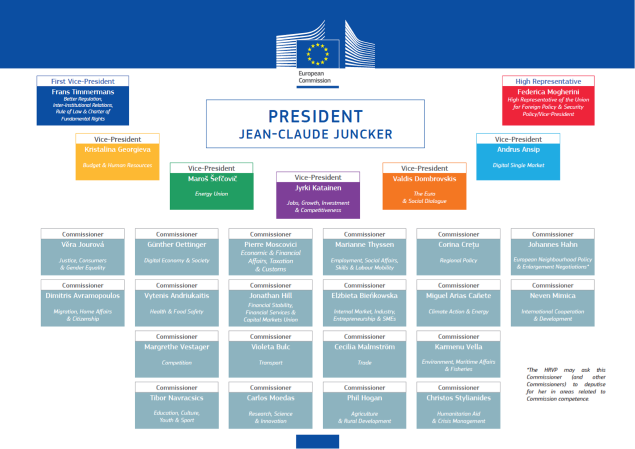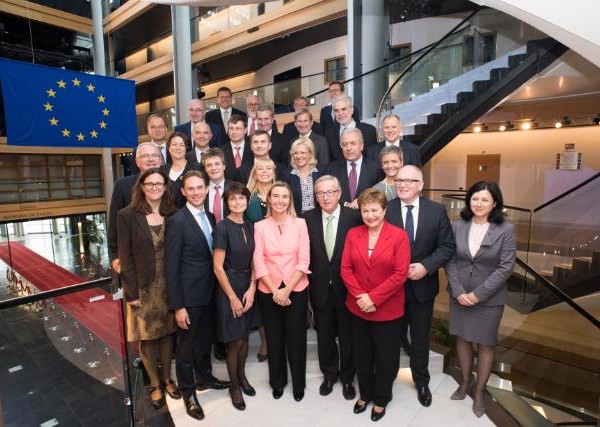The European Parliament (EP) has finally approved the new Commission, known as the Juncker Commission. After his election with a large majority by the European Parliament on July 15th, 2014, Jean-Claude Juncker, former Prime Minister of Luxembourg and long-time European advocate, has been working on shaping its tenure and designing his Commission for the 2015-2019 period. On October 29th, Jose-Manuel Barroso, the current President of the Commission, will participate at his last meeting at the helm of the Commission. On Thursday, Barroso will be meeting with Juncker and the newly appointed President of the European Council, Donald Tusk – whom would take his functions on December 1st -, for a last transition meeting before the beginning of the Juncker era.
On September 10th, 2014, President-elect Juncker presented his team and the distribution of the portfolios accordingly. Ensuing his presentation, each Commissioner-to-be was facing individual hearing before the relevant European Parliament committees. From September 29th to October 20th, the EP was interviewing each candidate. Out of the 27 designated, only one was rejected, Alenka Bratušek, the Slovenian candidate responsible for the Energy Union. Other candidates like France’s Moscovici, UK’s Hill, faced tough confirmation hearings. Jonathan Hill, candidate for the financial DG, was even called back for a second hearing. It is Frans Timmermans, a former foreign minister of the Netherlands, whom becomes the first vice president and will serve as Mr. Juncker’s deputy.

Four Questions for the Juncker Commission
Even though Barroso is still at the helm of the Commission (read here his defense of his tenure), one should take the time to raise a series of questions prior the shift of power at the Berlaymont.
1. Will the Juncker Commission be the political, social and human commission promoted at the time of the appointment of Juncker?
2. Making Europe closer to Europeans – reconciling Europe with the Europeans. How successful will Juncker and its apostles be at it? This issue is more than simply explaining to Europeans citizens what the EU does and doesn’t. It is in fact an important dimension considering the rise of the extremes – right and left combined – in most EU Member States. Juncker needs to create a new narrative explaining the importance of the EU – without sounding like a history professor – and demonstrating its relevance in order to assure the survival of European uniquenesses under the forces of globalization. The recent outcomes of the European Parliaments’ elections in May 2014 clearly demonstrated the gap between Brussels and Europeans. The blame ought to be distributed across the board: Member States have played the Brussels’ bashing game in order to cover up their incompetencies for too long; Brussels has sounded to distant and cold by adopting the approach of one policy fits all; European citizens have not done their jobs of citizens for too long – and even enjoyed the ride when the economic situation was stable and rosy – and have blamed the Euro and Europe for all their traumas – including high level of unemployment, which the Commission has no power over it -.
3. Member States – their support to the Juncker Commission will be crucial for a new energy in European politics. Under Barroso, the Commission has lost some of its relevance and power at the benefit of the Council and European Council. Juncker ought to make the Commission once again relevant and guardian of the Treaties. According to the Treaties, “the Commission has the sole right to initiate European legislation and the power to enforce treaties by suing member governments at the Court of Justice of the European Union.” But Juncker cannot do miracles with the current governments like the ones in the UK and France blaming all their turmoils on Europe. The most recent outcry by David Cameron about the extra €2.1 billion bill is a ‘joke.’ According to the EU budget commissioner, Jacek Dominik, British officials knew for 10 days the adjustment of their share to the EU budget based on changes in their gross national income (watch the video here). Cameron’s anger is simply political to attract his electoral base and the more extremes branch of the UKIP. In France, the recent submission of the new French budget falls under the same category, minus the anger. Core EU Member States are playing the card of domestic political appeal at the cost of European soundness. France cannot be upset at the rules that it had previously agreed on and voted in favor. Barroso undermined to some extent the power of the Commission, will Juncker bring it back?
4. How does Juncker get the EU become more integrated on important policies like foreign affairs, energy/environmental policies and fiscal policies among others. On foreign affairs, that would be in the hands of the HR/VP Mogherini. But on energy and environmental policies, the Juncker Commission could once and for all initiate a clear agenda for a shift towards greener energies, while contributing to economic growth – which has been addressed during the recent European Council meeting in late October -. In any case, “there is a sense that Juncker will try to solve Europe’s ongoing problems pragmatically,” writes Alice Pulh, “instead of launching brand new polices with innovative ideas.”
Food for Thoughts
Yes this section may be too far fetched, but it is actually an important point of discussion. A Commission with the representation of the 28 Member States (MS) is not only too large, but also anti-supranational by nature. The fact that MS are still the ones selecting their candidates and bargaining for the DG of their choosing is contrary to what the Commission should be all about. The President of Commission should be the one selecting the candidates of his choice in order to compose its own Commission. Additionally, having the MS promoting a candidate to represent themselves at the Berlaymont goes against the idea of the Commission being ‘above’ the Member States in terms of influence and power, and truly European -for whatever it means-. The Commission is not about defending national interests, but European interests. This new commission has highlighted a series of problems in balancing national and european interests, as illustrated by the difficult hearings and negotiations over three nominated commissioners, France’s Pierre Moscovici (economic affairs), the UK’s Jonathan Hill (financial services) and Spain’s Miguel Arias Canete (climate and environment).
Commission should be the one selecting the candidates of his choice in order to compose its own Commission. Additionally, having the MS promoting a candidate to represent themselves at the Berlaymont goes against the idea of the Commission being ‘above’ the Member States in terms of influence and power, and truly European -for whatever it means-. The Commission is not about defending national interests, but European interests. This new commission has highlighted a series of problems in balancing national and european interests, as illustrated by the difficult hearings and negotiations over three nominated commissioners, France’s Pierre Moscovici (economic affairs), the UK’s Jonathan Hill (financial services) and Spain’s Miguel Arias Canete (climate and environment).
Then, the Juncker Commission is facing a serious challenge, relaunching the economic engine of the EU. Following the EP vote approving the Juncker Commission, Jean-Claude Juncker said that
[it was] “time to roll up our sleeves and get down to work: to kick-start economic recovery, create more and better jobs, address the plight of Europe’s youth for a better future, protect the most vulnerable in our society and cope with the rapidly deteriorating geopolitical situation.”In order to re-launch the economic engine of the Union, two options are on the table. Juncker has inherited one option, the Transatlantic Trade & Investment Partnership (TTIP), and he has been advocating, option 2, for an EU-wide economic boost through investments. So one approach is from within, the other from outside. The TTIP was initiated under Barroso and has turned into difficult negotiations between the EU and the US and among the EU-28. The TTIP is supposed to create the largest economic bloc in the world in order to balance the rise of new powers like China, India and Brazil. The second option is the €300 billion investment package introduced back in July by Juncker. The package has been contentious as nobody knows where the money would come from and it seems very unlikely that the EU-28 would anytime soon pool the money into a common fund supervised and utilized by the Commission. Both aspects, the TTIP and the €300 billion investment package, shall be understood as ‘new deals’ in order to relaunch European economic engine. Juncker understands very well that a long-term sluggish economic environment could affect the survival of the European welfare states and ultimately the EU as whole.
(Copyright 2014 by Politipond. All Rights Reserved. This material may not be published, broadcast, rewritten or redistributed without permission).